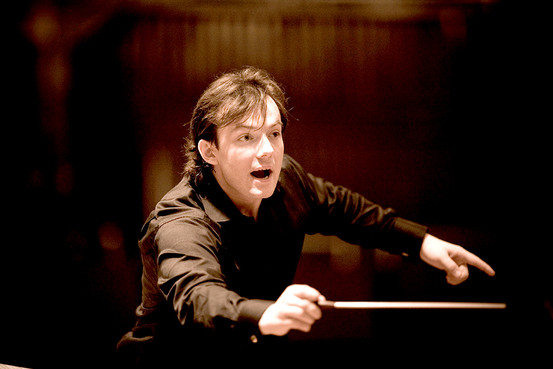There was a lovely narrative to last night's CBSO concert. The muggy oppressiveness of Britten's Four Sea Interludes (and Passacaglia) appeared somehow explained by Mahler's Kindertotenlieder, then dissolved by the love letters that were the Strauss songs and then finally set free - psychologically and orchestrally - in Debussy's La Mer. Parallel to this, the great German tenor Jonas Kaufmann was being washed out to sea; his Mahler and Strauss songs were being lapped at from both directions by Debussy and Britten's portraits of the salty waters.
Technically Kaufmann was anything but at sea. His vocal line was fluent, his tone beautiful and elegant to a fault. He wound his way round the hallucinations of the middle section of "Wenn dein Mütterlein tritt zur Tür herein" with composure and expressiveness. Even when the score began to ask more of him than his tessitura would allow, his voice never lost its musicality, its smoothness or its dark colour.
Kaufmann's rendition of Morgen was the stunner
But in repertoire as tragic as this, it actually would have been nice for his voice to have felt a little at sea. He could have absorbed, for example, some of the riskiness of the navigations of Nelsons's opening rendition of the Sea Interludes with the ever fantastic CBSO. Kaufmann certainly needed to excavate the emotions of Kindertotenlier more thoroughly.
I don't blame him for not fully succeeding. It's a mighty ask to demand a singer even try to enter into the ideas that Mahler and Friedrich Rückert ask them to. But even so, his attempts at a faltering quality were never quite believable - especially not in partnership with his chum Andris Nelsons. They just looked like they're having way too much fun. Fine for most repertoire. Really not fine when singing on the death of children.
Kaufmann may not be a born tragedian. But he is a born lover. And in the five Strauss songs that filled the start of the second half that chumminess of spirit between conductor and singer and that winning sultriness that Kaufmann has in spades began finally to find a place. There was an infectious enthusiasm to the start of "Heimliche Aufforderung" (Secret Invitation) that sank into an affecting wistfulness in the last stanza. In "Ruhe, meine Seele!" (Rest, my soul!) Kaufmann was able to show off his sotto voce - in which mode he can do just about anything - over the song's incredible pedal-stop-like orchestral sound.
 "Morgen", however, was the stunner. Kaufmann entered as he would continue, unassumingly, his arms folded, as if he were singing in a small room to friends. The song's simple statements of connubial bliss were delivered with such sincerity, such supreme vocal control and naturalness that the performance nearly received its own bout of applause. They like Kaufmann in Birmingham, they do.
"Morgen", however, was the stunner. Kaufmann entered as he would continue, unassumingly, his arms folded, as if he were singing in a small room to friends. The song's simple statements of connubial bliss were delivered with such sincerity, such supreme vocal control and naturalness that the performance nearly received its own bout of applause. They like Kaufmann in Birmingham, they do.
They don't like Debussy's La Mer, however. Ten or 20 early leavers I spotted. More fool them. They missed one of the great live La Mers. Much of the brilliance of Nelsons' (pictured above right) approach to conducting seems to stem from his concentration on tension, delivered through careful and intriguing accentuation, alongside an innately wise sense of pacing. The Britten came alive as a result of this care, especially the Sunday Morning interlude.
In La Mer the accents allowed the work to bob about the place beautifully. There was a fantastic brininess to the cellos and a glorious sun-kissed finish to De l'aube à midi sur la mer. The flickering games of the Jeux de vagues became a thrilling montage of colours. And what an arch he shaped in the Dialogue du vent et de la mer, building from the most broad and enigmatic of middles to the most swift, salty and raucous of ends.













Add comment